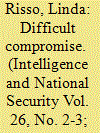| Srl | Item |
| 1 |
ID:
106605


|
|
|
|
|
| Publication |
2011.
|
| Summary/Abstract |
The launch of the Western Union in 1948 and the creation of the NATO Information Service in 1950 were important steps in the coordination of the Western response to Soviet and Soviet-inspired propaganda campaigns. By examining how the British Information Research Department worked closely with the International Organizations Division of the CIA in shaping the foundation and early activities of these intergovernmental agencies, this article offers new insight into the role of national information agencies within international organizations and contributes to explaining why, in the early Cold War, the West struggled to produce a coherent and fully coordinated propaganda response to communism.
|
|
|
|
|
|
|
|
|
|
|
|
|
|
|
|
| 2 |
ID:
166643


|
|
|
|
|
| Summary/Abstract |
This article examines how the Foreign Office’s Information Research Department (I.R.D.) worked with SAVAK, the Iranian intelligence service, between 1956 and 1968. It explores how a mutual fear of the Soviet Union compelled both departments to work together to produce and disseminate anti-communist propaganda. As well as the publication of books, prominent Iranian journalists would be given stories that praised the Shah’s regime and discredited the Soviet Union. SAVAK figures were also invited to Britain by the I.R.D. to attend training sessions on producing propaganda. The ties between both agencies, however, meant SAVAK was able to persuade the I.R.D. to assist in the conception of anti-Arab Nationalist propaganda, something that contravened wider British foreign policy. Moreover, such an agency-led approach was rendered short-lived. By 1968, many of the SAVAK figures friendly to the I.R.D. were promoted and replaced by individuals less keen on working with the British.
|
|
|
|
|
|
|
|
|
|
|
|
|
|
|
|